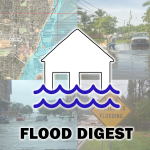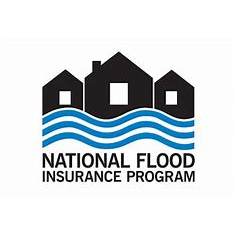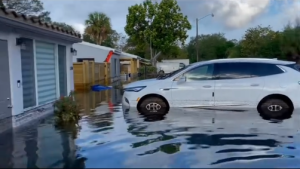Plus, the flood insurance disconnect
 A new bill that would allow monthly payments of NFIP premiums is floated by Florida Senator Rick Scott, Ft. Lauderdale shatters the annual rainfall record by nearly double, and a Chubb survey of insurance brokers finds a large lack of awareness of flood risk by middle-market commercial clients. It’s all in this week’s Flood Digest.
A new bill that would allow monthly payments of NFIP premiums is floated by Florida Senator Rick Scott, Ft. Lauderdale shatters the annual rainfall record by nearly double, and a Chubb survey of insurance brokers finds a large lack of awareness of flood risk by middle-market commercial clients. It’s all in this week’s Flood Digest.
 Monthly NFIP Premiums: Senator Rick Scott (R- FL) has proposed a bill (S. 2852) that would provide a grace period for National Flood Insurance Program (NFIP) policyholders when they default on payment of premiums. This is Scott’s latest attempt at curbing the rising prices of flood insurance in Florida. He’s also requesting that the FEMA Administrator restructure premium payments to be on a monthly rather than annual basis. The bill specifically provides coverage for policyholders who cannot pay their premium, allowing them to pay their deficits after a grace period via a supplemental payment structure. Earlier this year, Scott wrote a letter to the Senior Executive of the NFIP, David Maurstad, demanding answers and accountability as flood rates continue to increase across the state of Florida following FEMA’s Risk Rating 2.0. Scott said that the monthly payment structure is far more sensical and benefits the average Florida family, but there has been industry backlash over the administrative burden associated with restructuring payments.
Monthly NFIP Premiums: Senator Rick Scott (R- FL) has proposed a bill (S. 2852) that would provide a grace period for National Flood Insurance Program (NFIP) policyholders when they default on payment of premiums. This is Scott’s latest attempt at curbing the rising prices of flood insurance in Florida. He’s also requesting that the FEMA Administrator restructure premium payments to be on a monthly rather than annual basis. The bill specifically provides coverage for policyholders who cannot pay their premium, allowing them to pay their deficits after a grace period via a supplemental payment structure. Earlier this year, Scott wrote a letter to the Senior Executive of the NFIP, David Maurstad, demanding answers and accountability as flood rates continue to increase across the state of Florida following FEMA’s Risk Rating 2.0. Scott said that the monthly payment structure is far more sensical and benefits the average Florida family, but there has been industry backlash over the administrative burden associated with restructuring payments.

Ft Lauderdale Record-Breaking Rain: Ft Lauderdale has had its rainiest year since 1947, with over 108 inches of rain pouring down on the city so far in 2023. The city’s average of 60 inches per year was washed away after the torrential rain and flooding from three weeks ago, leaving many city streets, houses, and other buildings completely inundated with over 14 inches of rainfall measured in some places. This no-name storm caused $2 million in damage and pushed the annual rainfall in the city past the previous almost seven-decade old record of 102 inches. This also pushed Ft Lauderdale to be the wettest city in the US so far this year, culminating in much conversation on how to combat and predict flooding in the future. With almost a month left to the year, the city will undoubtedly have set a record for years to come.
![]() Flood Insurance Disconnect: Though the risk of flooding is undeniable and continues growing in both intensity and scope, results from a Chubb survey of insurance brokers about their middle-market commercial clients reveals clients widely underestimate and misunderstand the need for flood insurance. Only 16% of brokers say more than half their clients buy flood insurance. The report showed that many clients do not appreciate the severity of flooding, and even further, many brokerages did not even have the same definition of flooding or perception of the damage flooding can cause. The disparity between the need and actual purchase of flood insurance was evident across all regions of the country, but worst in the South where 45% of commercial clients were projected to need the coverage, but only 14% actually purchased it. Perhaps the biggest takeaway is that many clients mistakenly believe that property insurance covers some if not all types of flood damage, when it does not. The biggest reason for purchasing flood insurance was because lenders required it.
Flood Insurance Disconnect: Though the risk of flooding is undeniable and continues growing in both intensity and scope, results from a Chubb survey of insurance brokers about their middle-market commercial clients reveals clients widely underestimate and misunderstand the need for flood insurance. Only 16% of brokers say more than half their clients buy flood insurance. The report showed that many clients do not appreciate the severity of flooding, and even further, many brokerages did not even have the same definition of flooding or perception of the damage flooding can cause. The disparity between the need and actual purchase of flood insurance was evident across all regions of the country, but worst in the South where 45% of commercial clients were projected to need the coverage, but only 14% actually purchased it. Perhaps the biggest takeaway is that many clients mistakenly believe that property insurance covers some if not all types of flood damage, when it does not. The biggest reason for purchasing flood insurance was because lenders required it.
It’s not clear whether Chubb asked these brokers (who work for their clients and not the insurance company, as insurance agents do) “Do you talk to your clients about purchasing flood insurance, and if so, how?” This is a point I preach often. It’s the insurance broker’s and agent’s responsibility to educate their clients and protect them against perils. “If it rains, it can flood” especially here in Florida! This applies even more so to the personal lines side with homeowners. In fact, a recent USF survey made in collaboration with Neptune Flood Insurance showed that of 1,667 residents polled, 73% mistakenly believed they were covered by flood insurance. We must do better!
LMA Newsletter of 12-4-23

